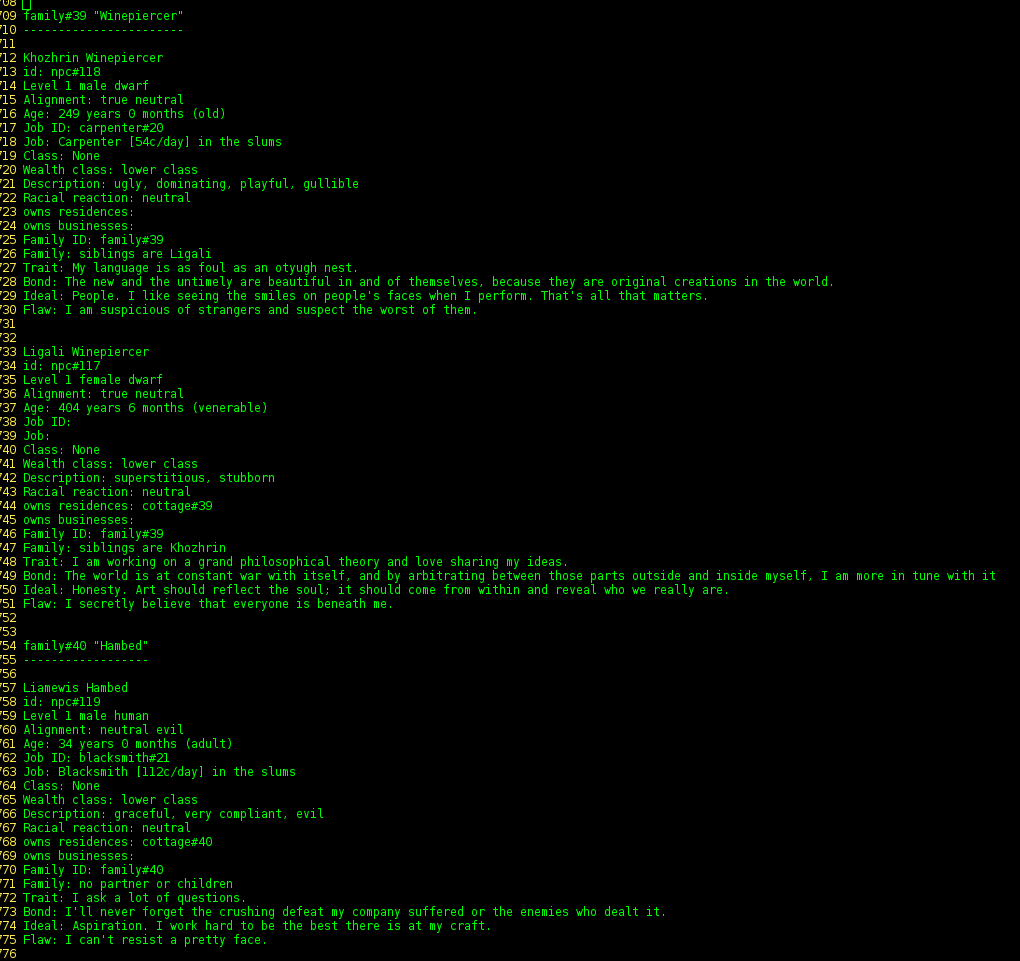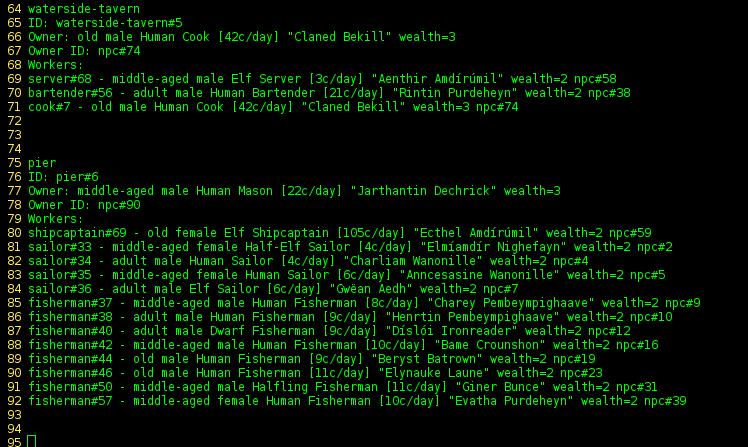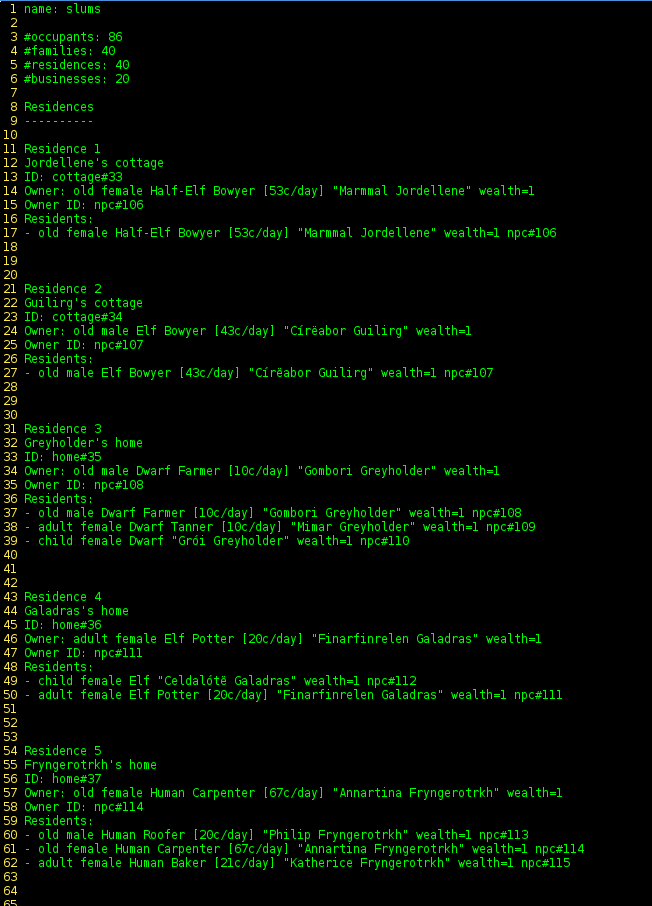Generate occupants and occupations for your custom village, town or city! (for D&D purposes or related) (please do not imbibe clouddistrict while under the influence of other medications)
Project description
Generate occupants and occupations for your custom village, town or city! (for D&D purposes or related)
Installation
From PyPI:
$ pip install clouddistrict
… or from the project root directory:
$ python setup.py install
Usage
Creating a town is simple:
usage: clouddistrict create [-h] [--config CONFIG] output_dir
Example create (defaults to town.yml if not specified):
$ usage: clouddistrict create --config example.yml example
After running the create, you will see a new directory named “example”, with lots of text files about the new people and buildings. For example, you will see entries like this in example/slums.txt:
family#36 "Billesibyn" ---------------------- Leme Billesibyn id: npc#107 Level 1 male human Alignment: true neutral Age: 70 years 0 months (venerable) Job ID: Job: Class: None Wealth class: lower class Description: stupid, romantic Racial reaction: likes humans, dislikes half-elfs owns residences: cottage#36 owns businesses: Family ID: family#36 Family: siblings are Nicter Trait: I eat like a pig and have bad manners. Bond: A powerful person killed someone I love. Some day soon, I'll have my revenge. Ideal: People. I'm committed to the people I care about, not to ideals. Flaw: I like keeping secrets and won't share them with anyone. Nicter Billesibyn id: npc#108 Level 1 male human Alignment: true neutral Age: 70 years 0 months (venerable) ...
However, you will need a configuration yaml file to specify the information on each district. See example.yml included in the repository.
example.yml:
# defaults if not specified in the district (in percentages, but any ratios work)
race:
human: 60
elf: 20
dwarf: 15
half-elf: 3
half-orc: 1
halfling: 1
# specific district settings, named however you want
districts:
cloud district:
# 100% human.
race:
human: 100
# Wealth determines the level of residences and commercial buildings, 1 2 or 3 (lower/middle/upper class).
# Wealth has to do with how much money a family starts with which determines how many businesses they can purchase and own.
# there are also some businesses which don't spawn in wealth 1 or 2. A bank won't spawn in 2, and an armorer won't spawn in 1.
# wealth: 2 will cover most of everything except a few businesses: Art gallery, bank, jeweler
# However, wealth 3 will allow any and every business and the wages will be higher than average, and the houses will be nicer.
wealth: 3
# Only 12 families live here.
residences: 12
# No shops, just rich people.
commercial: 0
upperclass merchant district:
# Just 20 shops here, but a mix of humans and elves.
race:
human: 70
elf: 20
wealth: 3
commercial: 20
middleclass merchant district:
# 30 shops of most things. We might see an Inn, an apothecary, a library. Wealth 2 includes almost everything.
wealth: 2
commercial: 30
middleclass houses district:
# Houses and Cottages are found here. 20 families (1 family per residence).
# Families may be a nuclear family, a single-mother or single-father, or older siblings, or even just a single person.
wealth: 2
residences: 20
pier district:
wealth: 1
commercial: 5
# Industrial relates to the "resource" type of buildings that house many workers
# The industrial currently available are: pier, mine, sawmill, quarry
# This means there will be 1 pier in this district. You choose how many and which specifically.
industrial:
pier: 1
# We specify water as true so we can have water type buildings like waterside taverns. Piers require it to be true in this case.
water: true
slums:
# The slums welcome anyone, and people run small poor businesses. They may not own them, but they work there.
# Families in the wealth=1 areas are generally too poor to own businesses, though sometimes one might own a cheaper wealth 1 business,
# like a butcher shop or a tanner.
wealth: 1
residences: 40
commercial: 20
the old mine:
# Another industrial-only area which only takes workers.
wealth: 1
industrial:
mine: 1
Use –help/-h to view info on the arguments:
$ clouddistrict --help $ clouddistrict create --help $ clouddistrict load --help



Release Notes
- 0.0.4:
Adding example and images
- 0.0.3:
Adding alignment and such
- 0.0.2:
Release
- 0.0.1:
Project created
Project details
Download files
Download the file for your platform. If you're not sure which to choose, learn more about installing packages.
Source Distribution
File details
Details for the file clouddistrict-0.0.4.tar.gz.
File metadata
- Download URL: clouddistrict-0.0.4.tar.gz
- Upload date:
- Size: 40.2 kB
- Tags: Source
- Uploaded using Trusted Publishing? No
File hashes
| Algorithm | Hash digest | |
|---|---|---|
| SHA256 |
64c73f5398450837f040662e9cd5051e801b3c590389b7e74b7c2963d1b0e64c
|
|
| MD5 |
5b24a8a5a080ce24a07137ba25b9dd14
|
|
| BLAKE2b-256 |
e8c0b16aecdd89621a5e8bbc2c5b3bcf0f7349daa51651b79e3292b458063721
|











